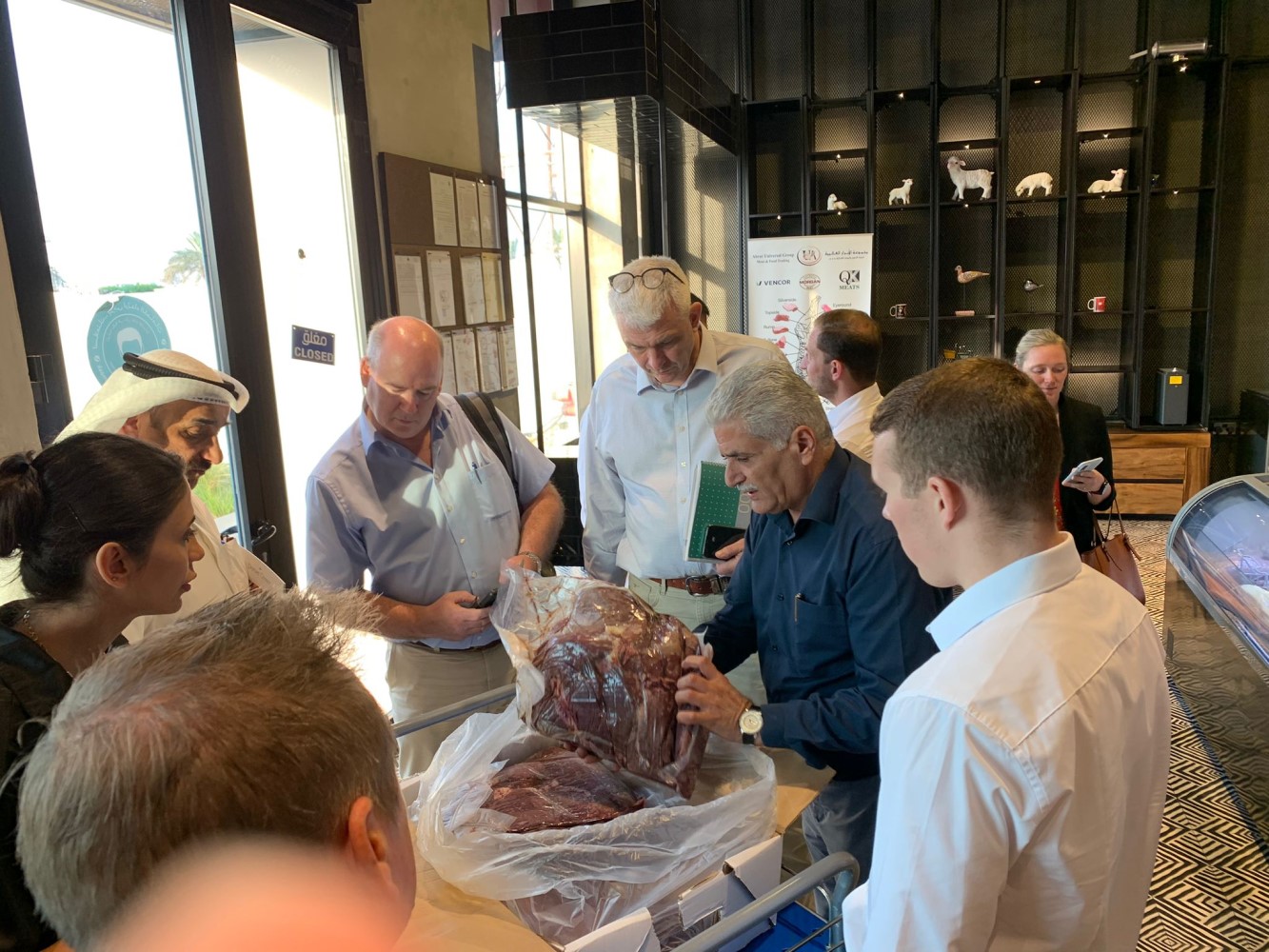 |
|
|
Halal to the chief
|
As Muslim communities in the West grow more affluent, demand is increasing for halal food products is also changing. Many store-bought halal products are imported from developing countries or are not perceived as having the same quality or brand value as their non-halal counterparts. Some Muslim consumers have been surveyed expressing their appreciation for ethical production, organic ingredients, and preservative-free foods, which indicates that a market niche among Muslim consumers remained unfulfilled.
In the US, a new company, American Halal, has seized this opportunity to offer a new range of halal ready meals aimed at a younger, more health and ethics-conscious demographic. The range of meals, sold under the brand Saffron Road, was picked up by Whole Foods Market, an upscale Austin, Texas-based market chain that specializes in natural and organic foods and specialty items. Saffron Road represented the first halal offerings by the company in its 30-year history.
The “Chief Halal Officer” of American Halal, Adnan Durrani, is a seasoned food industry executive and serial entrepreneur who founded Vermont Pure Holdings/Crystal Rock Water and was a principal of Stonyfield Farms and Delicious Brands. He speaks to us here about serving this growing market niche in the halal marketplace and how developing trends among Muslim consumers are changing commercial perceptions about halal foods within mainstream food markets.
![]() How did you gauge the demand for halal products in general and, specifically, for ready made products such as Saffron Road?
How did you gauge the demand for halal products in general and, specifically, for ready made products such as Saffron Road?
We did a macro and micro economic analysis and then looked at it from a top down and bottoms up perspective. We are very methodical about making sure that we are being as objective as we can on the halal opportunity within our “addressable” market. Now, this is not easy, since we are in uncharted territory so to speak when trying to quantitively assess the economics and demographics that make up American Muslims’ consumer buying power. While JW Thompson PEW, Gallup, and Ogilvy have done an admirable job at collating some anecdotal data, we needed to be much more precise with our addressable targeting. We used a number of more real-time proprietary databases, like Zabihah.com’s. Our big picture analysis was as follows:
A) The North American Muslim population is 8 million strong, growing at over 500,000 per year and will double by 2020.
B) Within this surging American Muslim demographic, there is also a meaningful percentage who are affluent, well educated consumers looking for and willing to pay up for 100% natural, anti-biotic free, 100% veggie-fed, and organic Halal foods. These are Whole Foods shoppers!
C) American Muslims buy over 25% to 35% or over $2.5billion of kosher products – more than Jews buy. Why? Lack of shelf space for Halal products in USA. There are 90,000 kosher products in the USA and only 1,000 Halal products. Hence, huge upside potential for Halal.
D) In EEC, Halal protein sales in 10 years have gone from less than $1 billion to $20 billion. Why? Primarily due to supermarkets – Tesco, Sainsbury, Metro, Carrefour, etc. – finally deciding in Europe to carry Halal products. France, with a smaller total Muslim population than the USA, generates over $2 billion in annual Halal protein sales due to French supermarkets. US retailers have woken up – now Walmart, Costco, Shoprite, SuperValue, Giant, and of course Whole Foods Markets started carrying Halal foods. The tide has started – now comes the tsunami!
E) In terms of ready-to-eat entrees, the way we looked at it is that the ethnic food sector in the US is around $70 billion. Frozen entrees represent over $15 billion. Indian has the largest growth in the category. There were no Halal Indian entrees in the supermarkets – let alone natural or organic. Moreover, even though Desi’s (of Indian, Pakistani, Bengali origin) account for only 30% of the American Muslim population, they account for over 65% of the wealth and 70% of the American Muslim college graduates. That was our “WOW” moment and defined spot on our target consumer.
![]() Regarding Saffron Road, you’ve stated that you’re aiming for a broader perspective on halal that you refer to as tayeeb. Can you explain what you mean by this? Is there more to tayeeb than just food production?
Regarding Saffron Road, you’ve stated that you’re aiming for a broader perspective on halal that you refer to as tayeeb. Can you explain what you mean by this? Is there more to tayeeb than just food production?
Our mission is to restore the sacredness of food. It’s about our whole spiritual connectiveness – with our creator, with our mother earth, with all living creatures God put on earth. It’s not just about how the animal was slaughtered, which most commercial Halal production and especially kosher factories focus on. Rather, for us tayeeb is a set of ethical Halal values that are core to our business, our products, our spiritual traditions. For example, we only use livestock that is 100% veggie-fed. We do now allow any antibiotics or growth hormones to be given to any of our livestock. Most significantly, we are currently the ONLY Halal certified or kosher chicken product in the world that qualifies as “Certified Humane®” by Humane Farm Animal Care. We source from smaller, local, or grass-fed farms – so we are very dedicated to using sustainable, just farming practices. We believe that the food we eat should come from animals that are raised and harvested in a mindful manner throughout the entire lifecycle.
![]() Sounds like there’s potential for this to appeal to a wider non-Muslim audience. If so, have you anticipated what percent of this market you can capture? How?
Sounds like there’s potential for this to appeal to a wider non-Muslim audience. If so, have you anticipated what percent of this market you can capture? How?
Absolutely. The organic, natural and sustainable products market started out as a tiny niche when I first got involved in it. Today, organic foods alone generate over $30billion in sales a year in the USA. In France and the UK, non-Muslims now account for slightly over 50% of all Halal food sales. Whole Foods’ managers tell us that Saffron Road’s products are stellar – that our authentic gourmet quality, our wholesome and 100% natural ingredients, and our Certified Humane® and gluten free designations appeal to a majority of Whole Foods’ consumers- 90% of whom are probably non-Muslim.
I have no idea of what percentage of the non-Muslim market we might capture, but suffice it to say that our business model is not built on only capturing the American Muslim consumer.
![]() Recently, Campbell’s Foods of Canada was targeted by right wing bloggers over its year-old decision to offer halal versions of its soups. How do you see yourselves dodging political minefields regarding halal foods sold in mainstream markets?
Recently, Campbell’s Foods of Canada was targeted by right wing bloggers over its year-old decision to offer halal versions of its soups. How do you see yourselves dodging political minefields regarding halal foods sold in mainstream markets?
Given that the Campbell Soups campaign was spearheaded by the xenophobes behind the Park 51 media onslaught, I don’t put a lot of weight on it once I filter it through an objective lens. But to address your point head on – realize Campbell Soups’ situation is very different. First of all, they are a mainstream Americana brand – Campbell’s is as all-American as apple pie. Secondly, I believe they converted a whole line of soups in Canada to Halal – in essence some consumers may have not had a chance to “opt-out” of Halal if they were already buying these same non-Halal Campbell Soups products. Of course all of this is silly at best and totally pedantic reasoning at worst since by going Halal Campbell’s was actually improving the quality, the same way kosher soups would, for the end user.
In any case, Saffron Road is a total opt-in for consumers. We only sell Halal products, always have since inception and always will. Our core consumers seek us out for our Halal and tayeeb qualifiers.
Secondly, Saffron Road is very pluralistic and ecumenical in all aspects of our branding. We do not wear dogma or religious scripture on our sleeve. We appeal to a much broader, timeless, spiritual ethos – our value systems draws a much wider net to be inclusive of all cultures, religions, races. In fact, our socially responsible mission is embodied in our foundation – “Prophets for Peace” – which will foster interfaith dialogue between Muslims, Jews, Christians, Hindus, Buddhists, and all faiths.
![]() Why did you decide to partner with Whole Foods Market as your launch customer? Isn’t there a risk that you’ll only be targeting a more affluent niche within the halal market?
Why did you decide to partner with Whole Foods Market as your launch customer? Isn’t there a risk that you’ll only be targeting a more affluent niche within the halal market?
For over 20 years, the strength and expertise of our management team has been primarily in the natural foods sector and Whole Foods is the #1 natural foods retailer in the world. With our team’s clout with the US supermarkets, we could’ve focused in debuting at any other select major retailer – such as Costco, Walmart, etc. However, Whole Foods was the only US retailer we felt “got-it” when it came to a cultural fit with our tayeeb ethos. We see little risk in targeting to the affluent consumers- that IS our target! We are not out to grab 70% market share of the mainstream American Muslim consumer – that’s not our business model. We aspire to work tirelessly to win over a slice of the lucrative premium, affluent, well educated, discerning, and brand loyal consumers like Whole Foods’ customers.
![]() How has the response been to Saffron Road so far and how do you plan to expand?
How has the response been to Saffron Road so far and how do you plan to expand?
The response has been overwhelming on all levels and far beyond our expectations. From over 10,000 new customers being drawn into Whole Foods, to almost every panel at AMCC giving us a positive mention – as well as at the World Halal Forum in the UK which we didn’t even attend – to Ogilvy Noor featuring us on a full page in their report, to over 1,000 positive Facebook comments on the quality and appeal of Saffron Road’s entrees, to a number of Whole Foods’ stores nationally selling out of product in the 1st month of distribution. Need I say more?
Yes, we will be expanding our retail distribution over tenfold in the natural food channel and aggressively entering thousands of mainstream supermarket stores in 2011.
(Disclaimer: Halalfire is the parent company of both altmuslim and zabihah.com)



